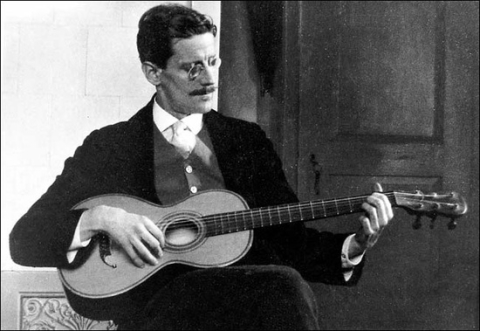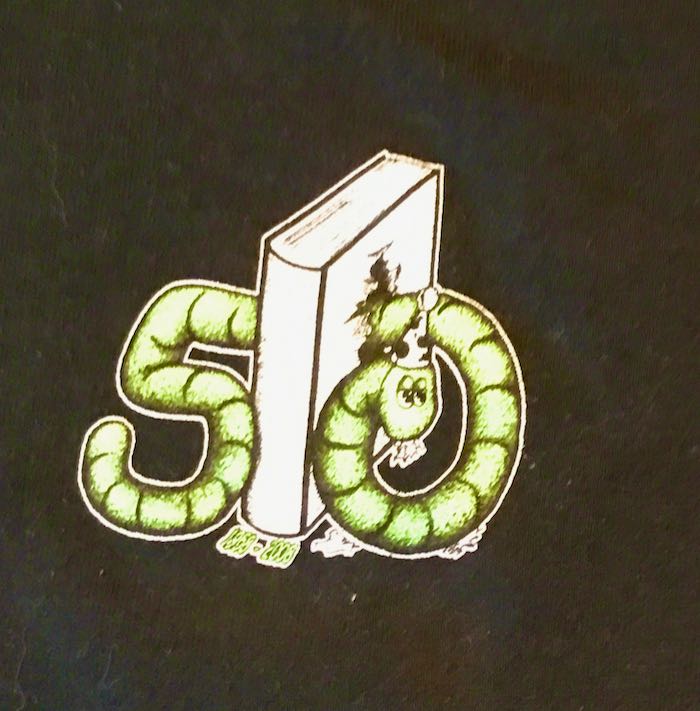There’s a lot to like about locally-owned bookstores. Bookstore t-shirts? Not quite so much. Maybe I’m a snob.
The average independent bookstore puts its logo on a t-shirt and stops there. Or — if wildly bold — a picture of its building, if it’s picturesque. Yawn.
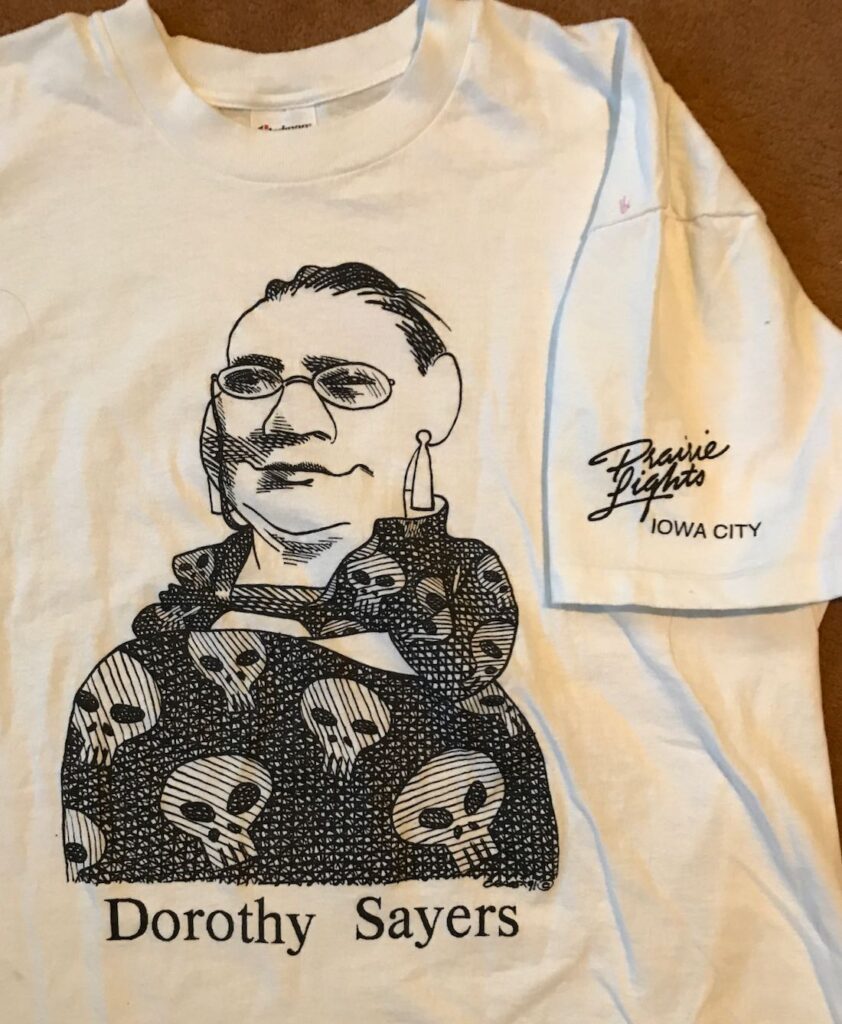
A little farther up the scale lie bookstore tees bearing pictures of famous authors. This one is from Prairie Lights, a famous literary bookstore in Iowa City. A famous San Francisco bookstore called City Lights” inspired its name.
The tee features a cartoon of early 20th-century mystery writer Dorothy Sayers, if that’s your idea of a good time. And it is, if you’re a bookstore that appeals to committed literati who appreciate genteel, dense ’30s-era British mysteries. The nearby University of Iowa hosts a famous writer’s conference, and that proximity no doubt influences the bookstore’s customer base.
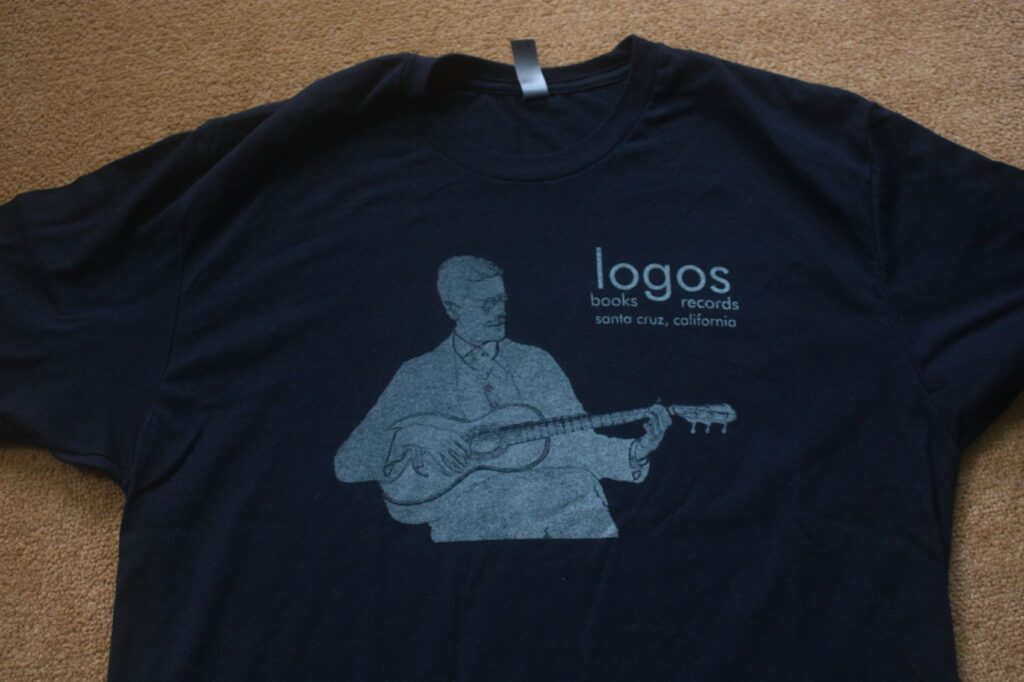
The meaning of this bookstore t-shirt is obscure to the average person. The shirt itself is so tasteful as to be drab. I didn’t underexpose the photo: the shirt really looks like that.
And it comes from the late, lamented Logos Books in Santa Cruz, California, the college town that I reside in.
Our town lacks a writer’s conference like Iowa City’s, or at least none that anyone cares about. Nevertheless, Logos was a new/used bookstore that emphasized the arts, culture, history and serious literature.
I’m not big on elevated literature or books on the meaning of meaning. But Logos was my go-to for remaindered art books and its history section.
Logos also featured a hefty audio section of used record albums and CDs; a decent selection of cult literature (name your cult); and a lower level full of general new/used books. You could find about every Dover art book ever published and a plush section of quality used children’s/YA books . The town’s underpaid elementary school teachers would descend upon it to scavenge, every Saturday morning.
Logos had a lot going for it. And when I needed a translation of Moliere’s Le Médecin malgré lui (all the rage in Paris in 1666), it was the only place in town with a copy in stock (used, copyright 1930-ish). But Logos wasn’t the kind of place I would hit up every week for the latest and greatest. Though music fans and school teachers surely did.
A few years back the store’s “new” sales crashed and never recovered. After that, Logos’ time was short. Damned Amazon.
As for the t-shirt, I tried googling “famous author playing guitar” to identify the t-shirt’s subject. Up popped James Joyce, with guitar. Yes, he played. And maybe, just maybe, the guitar-playing is meant to indicate the store’s music connection. Or… maybe not.
Logos always split its personality: fine literature and arts, absolutely. Meanwhile, the front windows brimmed with remaindered collections of 1940s science fiction comic books, and the music section was often the busiest part of the store.
If Logos had been the kind of store to have Hunter Thompson as its icon instead of Joyce, would it still be here? Santa Cruz is not Iowa City. Sometimes I wonder.
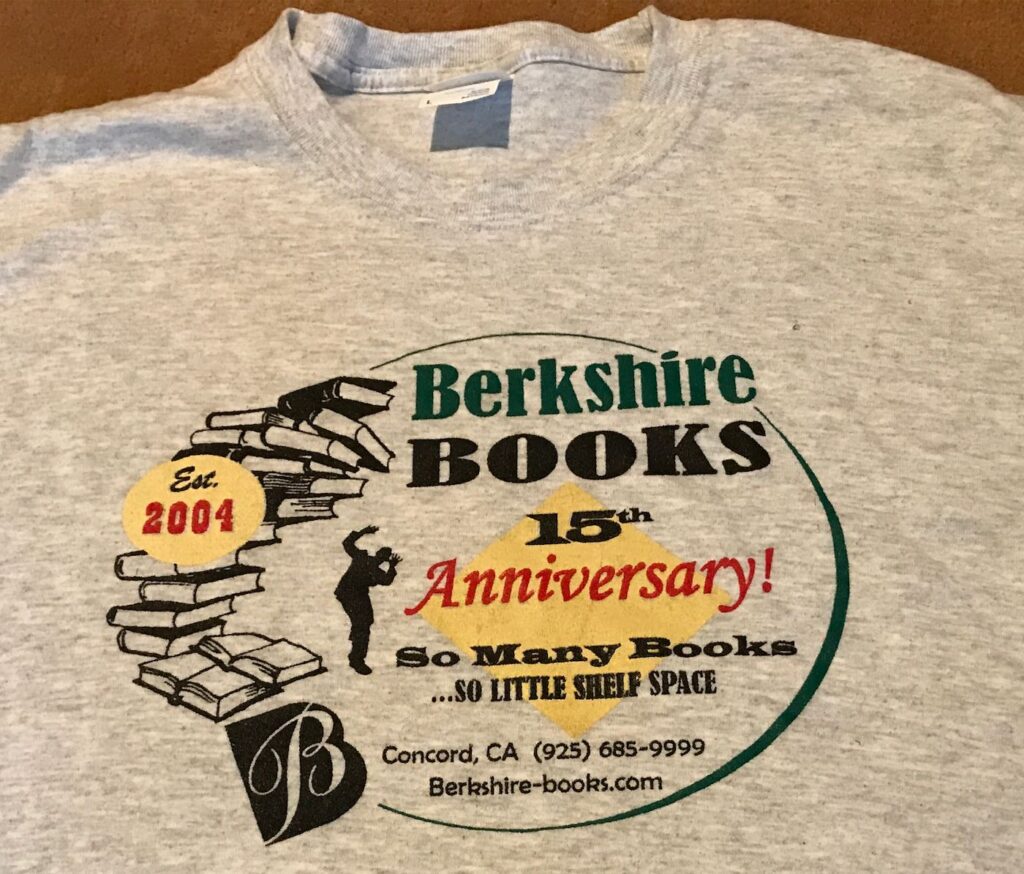
This t-shirt sends a clear and relevant message. It touches on that well-known literary issue known as Too Many Books. Which is heresy, because we all know that there is no such thing as Too Many Books. And yet…
The proprietors of Berkshire Books, friends of mine, are the kind of folks who overmaxed their bookshelves at home and then filled random corners of the house with tottering towers of treasured tomes that lacked even an inch of shelf space to call their own.
So my friends founded a used bookstore (they had experience) and devoted part of their collections to it. In this way some of their books would be sold and thus diminish the book pile-age at home. So that they could move around more easily — or at all. And yet they would see those books again, as new stock sold to the store by customers.
“And then we can have them again for awhile until we sell them again,” they told me. The process could repeat endlessly. My friends had found the answer to the Too Many Books dilemma: intermittent ownership.
But this solution ran up against pesky external forces that brought good books flooding in the doors. First came the Great Recession, when cash-strapped citizens flogged their books to (they hoped) make the rent.
Then came the second real estate boom, which encouraged retirement-age Baby Boomers to sell off their suddenly-valuable homesteads and downsize. And guess what? Their new places wouldn’t have room for all their books. So…
Berkshire Books is itself now a land of tottering towers of tomes in search of shelf space. It’s not that business is bad: it’s good enough even in COVID times, thanks to the store’s online book trade. But there are just Too Many Books. Once again.
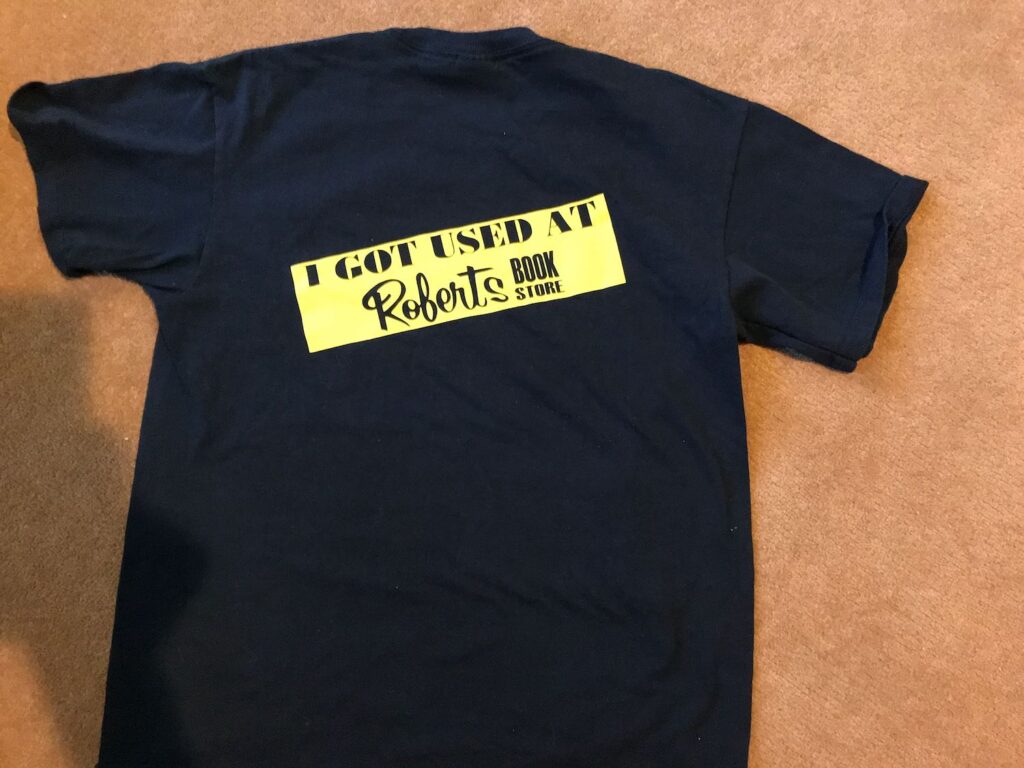
This tee from Roberts Books has attitude; even the bookstore’s name has attitude. The founder, whose first name was Robert, eschewed his possessive apostrophe in the name because he didn’t believe the store belonged only to him.
And I knew the place. I bought books from Roberts in my college days. For many years Roberts Books was the off-campus alternative to the campus bookstore at San Jose State University in San Jose, California. It sold textbooks, and textbooks only.
Generations of students (including me, at one time) trooped to Roberts at the beginning of the semester to buy textbooks for their classes. If possible, we wanted the cheaper “used” ones. At semester’s end we’d all troop back to resell the texts to the store. At a lesser price, of course.
Every starving student feels a little “used” by college bookstores: “If you’re selling them for this, why are you only paying me that?” I’m sure Roberts staff got that noise from cash-strapped 19-year-olds. Often.
But it never looked like anybody was getting rich at Roberts, with its plywood walls and stockroom-style metal shelving and buff-colored industrial carpeting. It was just a book warehouse, family-run for decades. This tee was issued for its 50th anniversary in 2009.
Sadly, Roberts closed its doors four years later. The landlord hiked the rent just a bit too high, and the campus bookstore (taken over by bookstore giant Barnes and Noble) stopped giving Roberts the lists of required books for the upcoming semester. You can’t “get used” at Roberts anymore. Sadly, the world’s still full of people who’ll happily use you.
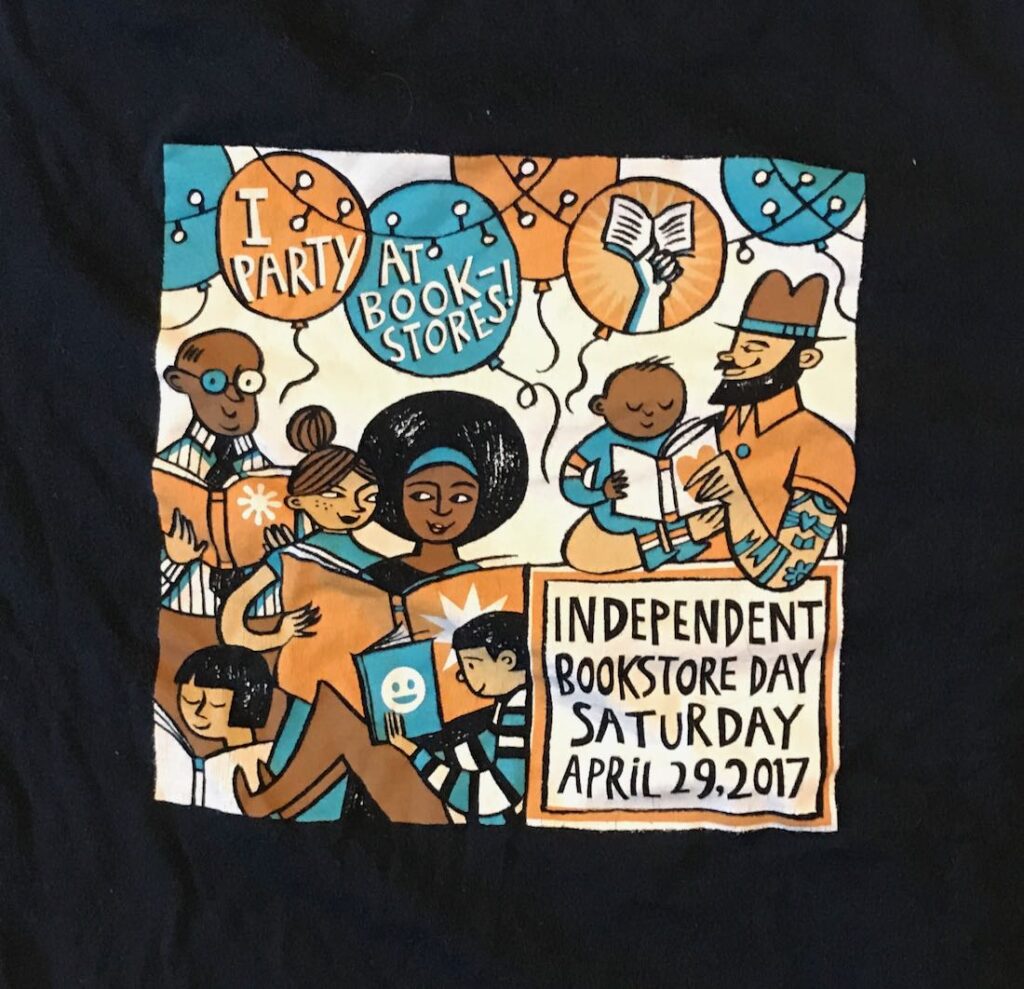
And finally this: a t-shirt not from a bookstore, but from an association of independent bookstores. Community bookstores are feisty and endangered species these days; not for no reason were half the t-shirts above from stores that no longer exist.
And we must honor independent bookstore for their service in the cause of literacy and diversity. I just can’t see myself in a t-shirt that so proudly proclaims my own woke-ness to the world.

